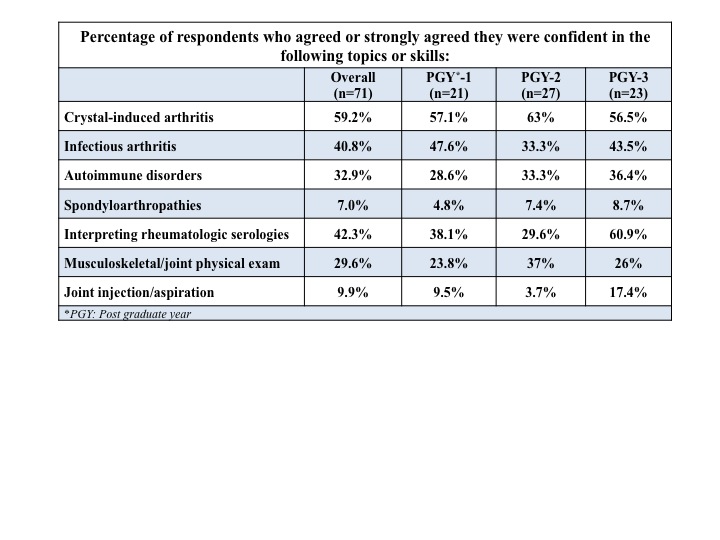Background/Purpose: Small studies have demonstrated a lack of confidence and competency in the areas of rheumatology and musculoskeletal diseases among internal medicine physicians at various levels of training. This can lead to a delay in the diagnosis of rheumatologic disease and may result in suboptimal patient outcomes and increased morbidity. Increasing time devoted to teaching the subject has been shown to increase resident confidence, suggesting that an intervention could have a significant impact on residents’ ability to diagnose and manage rheumatologic diseases. We aim to assess resident confidence in rheumatologic and musculoskeletal topics and skills in order to evaluate the need for an educational intervention.
Methods: We emailed a survey to the 137 residents in the Department of Medicine at a large, urban university hospital. The survey included 6 questions on a 5-point Likert scale measuring self-assessed knowledge of rheumatology topics and confidence in musculoskeletal exam skills. Questions regarding non-rheumatologic topics were included to control for increased confidence across post-graduate years related solely to increased experience.
Results: Seventy-one responses were collected for a response rate of 51.8%. Resident confidence in rheumatology was generally low. Fewer than 60% of respondents agreed or strongly agreed that they were confident diagnosing and managing musculoskeletal and joint diseases. Fewer than 50% of respondents reported confidence in skills such as interpreting rheumatologic serologies, performing a musculoskeletal exam or performing a joint aspiration or injection. This is in contrast to the more than 77% of respondents who reported confidence in diagnosing and managing hyperthyroidism or coronary artery disease. Similarly, more than 73% of respondents reported confidence in interpreting electrocardiograms or thyroid function tests. While confidence related to non-musculoskeletal diseases tended to improve from first to third year of training, confidence related to musculoskeletal diseases tended to remain poor despite increased experience. Respondents reported interest in receiving further training in musculoskeletal topics in which they lacked confidence.
Conclusion: Internal Medicine residents at our hospital have low self-assessed knowledge and skills in the areas of rheumatologic and musculoskeletal diseases. We believe our hospital is representative of residency training in the United States, and a dedicated educational curriculum to fill these gaps in training could improve resident confidence and knowledge. Ultimately, we hope this will impact patient care and improve rheumatologic outcomes.
Disclosure:
C. Savasta,
None;
D. Korenstein,
None;
Y. Ali,
None.
« Back to 2014 ACR/ARHP Annual Meeting
ACR Meeting Abstracts - https://acrabstracts.org/abstract/internal-medicine-resident-confidence-in-rheumatologic-and-musculoskeletal-diseases-a-needs-assessment-survey/

